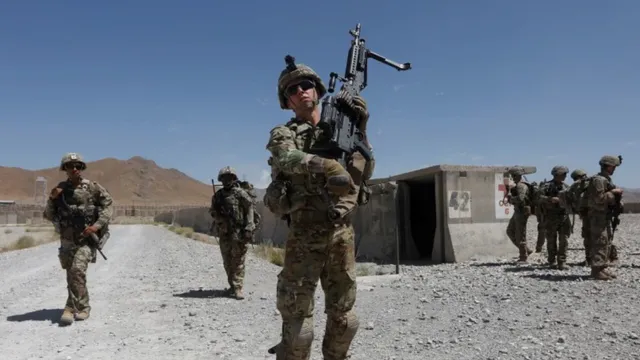- By Supratik Das
- Fri, 29 Aug 2025 05:25 PM (IST)
- Source:JND
Facing persistent recruitment shortfalls, the United States Army has implemented a new online outreach campaign by partnering with social media influencers on TikTok and Instagram to recruit Generation Z soldiers. The action demonstrates a radical change in how the Army attempts to generate exposure among younger generations more prone to scrolling through feeds than stopping by recruitment centers.
According to reports in The Guardian and Fast Company, the Army has started sponsoring social media content, working with lifestyle, fitness, and action sports influencers to showcase military life in a way that is interesting, aspirational. Fitness influencer Steven Kelly, who has over 1.3 million followers on Instagram, surprised his following by posting pictures in Army fatigues, scaling rope walls, and firing weapons in place of his normal workout posts. “This experience showed me how the Army builds readiness, resilience, and discipline, preparing Soldiers to face challenges head-on and succeed in any environment,” Kelly wrote in a July post, adding a link in his bio for followers to explore Army career opportunities. The post, marked with the hashtag #Ad, drew mixed reactions—some applauded the partnership while others dismissed it as “war propaganda,” with one user commenting, “It’s giving Hunger Games. It’s giving Class Wars.”
Reaching Gen Z Where They Are
US Army recruiting representative Madison Bonzo explained that influencers are carefully selected to fit within Army's brand standards and relevance to the audience. "Those alliances expand the Army's visibility, expose the Army to untapped audiences, and express the potential of Army service in new and innovative terms," Bonzo explained to Fast Company. As part of its 250th anniversary celebration earlier this year, the Army hosted more than 30 influencers to get up close and personal with military training, giving them access to veterans, soldiers, and training exercises. The goal, officials explain, is to provide real windows into military life while establishing connections with potential enlistees who might not have been raised with military families or ROTC programs in their lives.
Kelly isn't alone. The Guardian reported that Breannah Yeh, a social media influencer with a following for slacklining and adventure videos, recently went tandem skydiving with the Army's sponsorship. In a video, an Army captain said, "Challenges are what let us grow," before Yeh parachuted from the aircraft. Following a landing on a beach via an Army-stamped parachute, Yeh yelled, "That was so epic.". I do feel pretty incredible." The commercial concluded with the Army's motto: "Be All You Can Be." Other influencers from different fields, including chefs and travel bloggers—have also been enlisted in the campaign, which indicates that the Army is not only aiming at athletes or bodybuilders but a larger range of Gen Z culture.
ALSO READ: US Army To No Longer Allow Transgender People To Enlist In Military After Orders By Prez Trump
Recruitment Struggles and The Pandemic Effect
The Army's turn to influencer marketing follows back-to-back years of falling short on enlistment quotas. The service missed by almost 25 percent in 2022 and 2023, though it did manage to reach its 55,000 new soldier target for 2024, though only after reducing the amount by over 10,000. Positively, the Army reported in June that it had already surpassed this year's increased goal of 61,000 recruits—four months ahead of the required pace. Experts quoted by The Guardian point out that the COVID-19 pandemic had a significant role in disrupting conventional recruitment channels like on-campus ROTC programs and school outreach. Katherine Kuzminski, Director of Studies at the Center for a New American Security, informed The Guardian that it became more difficult to reach young adults during remote school years. "It became difficult to reach this whole generation of young adults who were in transition," she stated.
ALSO READ: Inside ICE Training Academy: How New Recruits Prepare for Trump’s Mass Deportation Plan
Jess Rauchberg, a Seton Hall University Assistant Professor, went over some of the influencer efforts for The Guardian and concluded the Army is taking advantage of uncertain economic times. "The military is saying, 'Our numbers are down and Gen Z is hurting for jobs and stable lives,'" Rauchberg said. "Partnering with creators is a way to offer stability, if you work for us, we will take care of you.". That's attractive to many youth. As recruitment totals now begin to recover, the Army's digital-first approach potentially has a winning formula in redoing its image for the TikTok generation. Though detractors call it propaganda, officials maintain that highlighting the Army through influencers of similar backgrounds demystifies military service and creates doorways for those interested in career fields of discipline, benefits, and stability.

